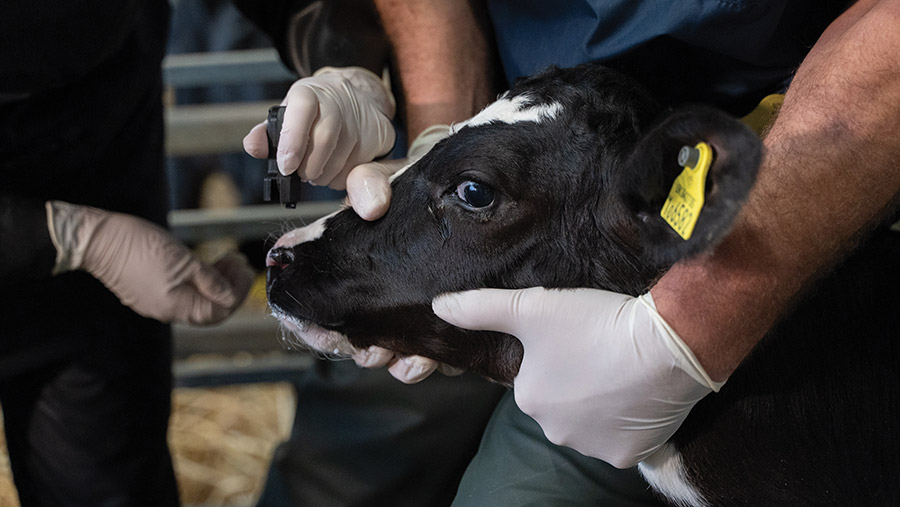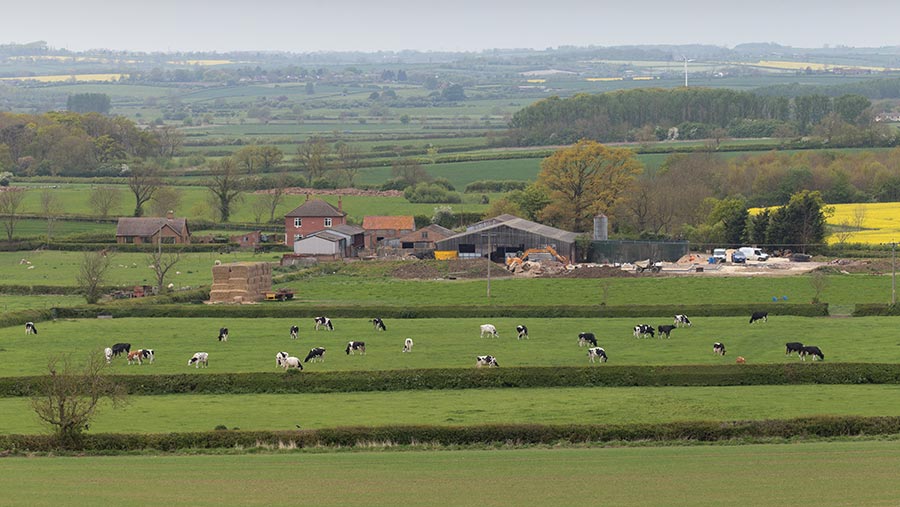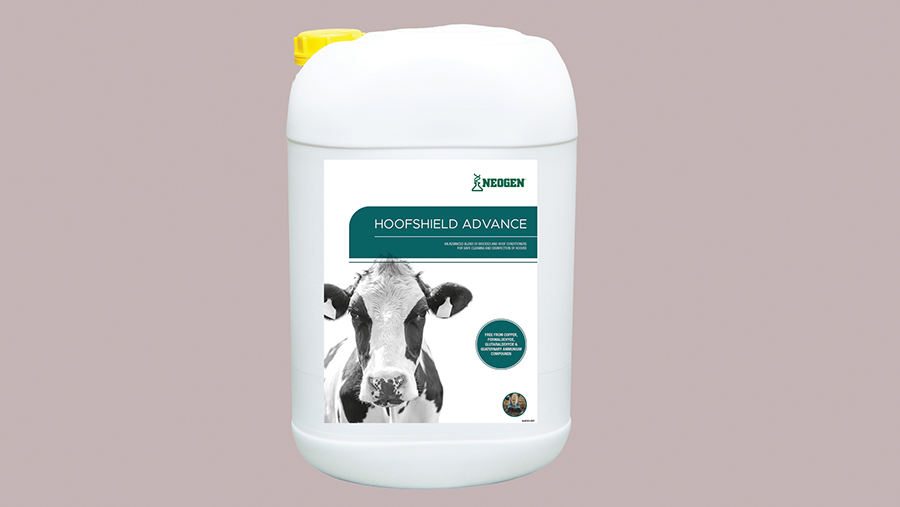6 products at Dairy-Tech to improve efficiency
 © Bimedia UK
© Bimedia UK Innovations to make UK dairy farms more efficient and productive while meeting the challenges of environmental guardianship, animal welfare and business sustainability are vital.
Companies will showcase products that can advance farm productivity, yet maintain the all-important focus on cost-effectiveness.We look at some products that will be on offer at the event in Warwickshire on 7 February.
See also: 6 livestock tech developments to look out for
ImmunIGY Bovine IgG calf immunity test
Bimeda UK
A calf-side pin-prick blood test, based on a lateral flow device, can now check whether a calf up to 42 days old has received enough antibodies from drinking sufficient good-quality colostrum.
The calf’s nose is pricked at the top to produce a small, reliable bleed – enough to fill a capillary tube.
This is tipped into a bottle of buffer solution and shaken to produce a stable sample that can be kept at room temperature until testing.
The test simply uses three drops from the sample in a well, with results after 10 minutes via an electronic reader.
Unlike other tests on the market, it is a direct measure of immunoglobulins rather than an estimate from measuring total protein
Early detection of a calf’s immune status allows animals with lower levels of immunoglobulins (below the recommended 12.5mg/ml) to be separated and managed accordingly because they are more susceptible to disease.
This may involve vaccinating for pneumonia, for example. Colostrum management can also be improved for the next batch of calves.
Current tests for passive immunity transfer require a skilled operator (usually a vet) to take an intravenous blood sample, which is then processed and sent to a laboratory.
These tests are only valid for the first seven days of life.
Price: £9 per test (sold in packs of 10) plus £14 for 100 capillary tubes.
Contact: Connor Smith: 07501 931 605.
Calf-immunity.co.uk/

© Spread-a-Bale
Bedding machine for tight spaces
Spread-a-Bale
The Micro Side Throw is designed to fit on small skidsteers or telehandlers to spread straw in small buildings such as calf houses and those with narrow access points.
The machine combines a 695kg lightweight steel chassis and bracketing system, and measures 1.78m wide.
The header features a single vertical rotor with side discharge of straw either to the left, to the right or forwards, facilitated by the turn of a valve and canopy.
The machine spreads a 1.5m round straw bale or half a rectangular bale at a time and offers a longitudinal spread pattern of 1m wide and up to 7m throw, with minimal dust.
The spreader can mechanise straw spreading in calf hutches or cubicles without the dust of a chopping machine, saving labour by 75% and straw by 50%, compared with manual spreading, says Spread-a-Bale.
Price: £15,750 ex VAT, including brackets.
Contact: Dave Bull, 07904 899 289.
spread-a-bale.com

© Tim Scrivener
Help with cutting utility costs
TCD Energy
Dairy farmers can save money on their utility bills by getting a free audit and advice on the best tariffs from energy brokers TCD Energy.
The company reviews historic bills and consumption for gas, electricity and water to identify opportunities to switch to cheaper tariffs or suppliers, taking into account seasonal peaks and troughs in consumption.
It can also review solar or wind power options, offer access to grant funding, and advise on sustainable heating solutions for farmhouses.
About 80% of the farming businesses the company has helped so far have been able to cut costs with, on average, reductions in utility bills by 30%, as well as recovering overpayments to energy suppliers on their behalf.
Many dairy farmers, for instance, are paying too much VAT on energy used by the farmhouse: residential electricity is rated at just 5% and the farm’s energy use can be allocated proportionally.
Overpayments can be reclaimed dating back four years.
Price: TDC Energy works with more than 20 suppliers as an energy broker, so when a customer switches tariff, it is paid a processing fee – hence the free auditing service.
Contact: 0333 335 5200.
tcdenergy.com
Slurry inoculant to cut crust formation
EnviroSystems
A slurry inoculant containing specialised strains of bacteria and fungi has been found to reduce crust formation on stores by almost a third.
Research into redeveloping the SlurryBugs additive was carried out ahead of the 2027 date for mandatory slurry store covers.
Covers prevent ammonia emissions, but after four years, they can lead to severe crust accumulation, points out Dr David Townsend of EnviroSystems. “This can reduce slurry storage capacity by 60%,” he says.
Studies narrowed down 100 potential strains of bacteria and fungi to seven that could be tested for use commercially to reduce the weight and volume of the crust formed when using a cover.
“Without farmers managing the crust, they will have no idea what is happening underneath the cover and, by the time a crust becomes noticeable, it might be too late to intervene,” David explains.
He says using SlurryBugs and SlurryBugs Maintenance will help minimise crust formation by re-distributing it within the slurry, which will, in turn, maximise slurry storage.
David adds that the nutrient value of slurry is also improved through releasing trapped nitrogen, carbon, phosphate and potassium materials into the slurry.
Ultimately, enhancing its value helps reduce bought-in fertiliser.
Price: One sachet (1.5kg) of inoculant treats 500cu m of slurry for the duration of its storage and costs £180 ex VAT.
Contact: 01772 860 085
envirosystems.co.uk

© Neogen Still
Digital dermatitis foot-bath treatment
Neogen
Hoofshield Advance is a foot-bath treatment containing a biocide that specifically acts against digital dermatitis pathogens. It also contains a distinctive blue dye to easily identify that all four feet have been treated.
It is free from formaldehyde, copper, and glutaraldehyde and quaternary ammonium compounds. It contains a foaming detergent and hoof conditioner to make it part of a regular management routine.
The biocide used is triamine. This is safe to use and can be released into the slurry pit.
In trials on farm, the solution has routinely been used at 10ml/litre for prevention, or, where hoof condition needs attention and lameness is a concern, a one in 80 dilution as a treatment.
The foot-bath needs replenishing after 250-300 cows have walked through it.
Price: On-farm starting price is £125 ex-VAT for a 25kg bucket.
Contact: Jonathan Nash, 01706 344 797
neogen.com
Predicta Guardian software for transition disease
Dairy Data Warehouse
Identifying cows at risk of transition disease to prevent problems with metabolic stress in early lactation can now be done earlier, by analysing lactation data supplied at milking.
Milking operators receive an alarm by email, WhatsApp, or text from Predicta Guardian six to eight weeks before the disease is likely to occur.
This allows management to change in the dry period to prevent or mitigate problems for individual cows, rather than having to use blanket control methods.
The software works by using milk records, drying-off dates and reproductive information. These are put into a model, which then learns lactation curves for each cow, matched with her fertility data, to identify those animals at risk.
Mandatory records include insemination dates, milk records and drying-off dates. Adding in events and treatments for issues such as mastitis and lameness will support the program. The platform connects to 80% of common software used on dairy farms.
Price: There is a herd fee plus a cow fee, which works out at £350-£400 a year for a herd of 180-200 cows. Farmers can access a two-month free trial.
Contact: inquiries@dairydatawarehouse.com
Dairydatawarehouse.com
Dairy-Tech takes place on Wednesday 7 February at Stoneleigh Park, Warwickshire. Tickets can be pre-booked at dairy-tech.uk/visiting/buy-tickets/
